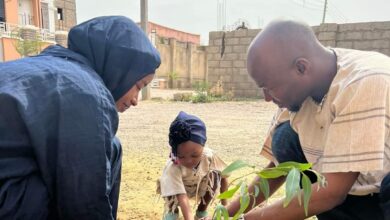
An audio recording containing former Boko Haram leader, Abubakar Shekau’s last message to the group on Tuesday, May 18, provides a rare glimpse into the group’s journey with global terror organisations, grievances against him, and the onslaught from the Islamic State’s West Africa Province (ISWAP).
In the 29 minutes-long message, Shekau spoke of his first allegiance to Al-Qaeda after the group moved to the forest areas and how Boko Haram, under his leadership, again pledged allegiance to the Islamic State (ISIS).
In March 2015, Boko Haram had become an affiliate of the Islamic State and subsequently rebranded to ISWAP. However, a 2016 breakaway faction headed by Abu Musab al-Barnawi (Habib Yusuf) retained the name as Shekau’s group reverted to its original name and structure.
HumAngle has previously reported the chains of events and skirmishes that led to the death of Shekau following the invasion of Boko Haram’s stronghold in the Sambisa forest area by a column of ISWAP fighters in multiple gun trucks.
The defiant leader in the audio started by mentioning the Islamic date (Shawwal 1442) and later on the day “Talata” in Hausa, which means Tuesday, to remove any doubt about when the statement was made.
He said he was passing the message in Hausa after a previous address that was made hurriedly in Kanuri language, and he wanted it to get to members and even to the rival militant group.
“I want this message to be disseminated even by jinns to where we want it to go,” he said.
Shekau lamented, “we can see a battle has taken place, members have been killed and many have been injured in this fighting that involved insiders, but they did not do it.”
He mentioned the calamity that befell his group, which he attributed to betrayal, and acknowledged that ISWAP members were moving around to “deceive” his followers with explanations for their actions.
“They are telling people, ‘We are all one, we are originally the same, and we didn’t bring war. Our goal is Imam Shekau and what he did us.’”
He also said that the group in another narrative said everyone knew they were Shekau’s qa’ids (commanders), they were together, and there was no problem. Still quoting ISWAP, he said they added that if there was a way, Shekau should be informed to submit to Abu Ibrahim.
Abu Ibrahim al-Hashimi Al-Qurashi is the current leader of the Islamic State and successor of Abu Bakr al-Baghdadi, killed in the United States-led raid in northwestern Syria.
Shekau went further to explain what caused the fraction and skirmishes, stating that what divided them was about the creed.
He explained that he did not rebel against the Caliph, and it was people in their midst who brought disbelief, came between them, and refused to deliver messages about the problem to the Caliph (IS central).
The Boko Haram leader mentioned the differences and disagreement that arose; from the type of designation to be used, to the treatment of Nigerian Muslims including abducting slaves.
He followed up with comments on his initial allegiance to Al-Qaeda, funds and weapon support provided to the group, and events that led him to pledge new allegiance to ISIS after a message was sent to the former leader and a response was received.
Shekau was defiant in the audio message, which appeared to have been made before a gathering. He explained his position on religious creed and areas of friction such as takfir (ex-communication from Islam) and enslavement.
He said it was okay to consume modern drugs and soft drinks, as he himself did, but maintained his ideological position on western education, insisting that school attendance was forbidden.
He urged the opposing group to let him hear the voice (statement) of the incumbent ISIS leader on what he was doing, saying he believed even the former ISIS leader was not aware of what happened, referring to the early days of the rift between the factions.
Support Our Journalism
There are millions of ordinary people affected by conflict in Africa whose stories are missing in the mainstream media. HumAngle is determined to tell those challenging and under-reported stories, hoping that the people impacted by these conflicts will find the safety and security they deserve.
To ensure that we continue to provide public service coverage, we have a small favour to ask you. We want you to be part of our journalistic endeavour by contributing a token to us.
Your donation will further promote a robust, free, and independent media.
Donate Here




